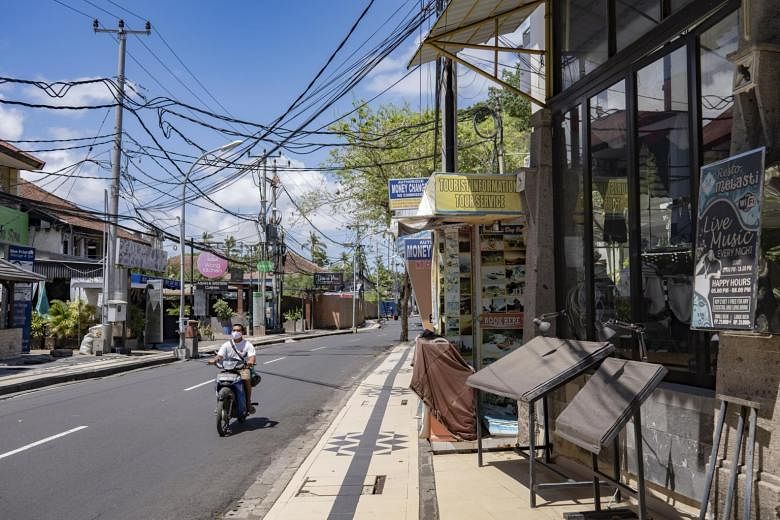JAKARTA - After laying off six of his eight staff at the onset of the coronavirus pandemic, Mr Abhishek Rathod, owner of vegetarian eatery Tea Villa Café in Singapore, was in a bind.
Mr Rathod and his remaining staff were sometimes juggling as many as half a dozen online queries and takeaway orders at once. So the company expanded its use of automated bots, from Singapore-based IT company Jumper.ai, to handle the most basic questions.
Liberated, Mr Rathod turned to navigating the shoals of the pandemic like developing two- for- one promotions that would work through his inventory of more than 100 different types of tea.
"We needed to focus on how we were going to increase sales," Mr Rathod said.
From cafes in Singapore to neighbourhood "sari-sari" convenience stores in the Philippines, micro, small and medium-sized businesses are struggling. The number of insolvencies of small and mid-sized enterprises in Asia will rise 25 per cent by next year, according to the International Finance Corp, the private sector sister organisation of the World Bank.
At stake is a segment that employs as much as 97 per cent of the workforce, as is the case in Indonesia.
But the pandemic has also accelerated the penetration of tech among those smaller businesses left standing, as they adopt or double down on automated bots, online ordering and cashless payments.
Indonesian payment platform OVO, for example, has said that e-commerce traffic through the platform has more doubled and the number of new users has jumped nearly fourfold since the start of the pandemic in March.
"We're aware of a shift of businesses to using digital technology to survive through the impact of Covid-19," said Mr Alfonso Garcia Mora, IFC's regional vice-president for Asia and the Pacific.
To be sure, technological fixes aren't the only answer.
When its occupancy rate was "in the teens" at the onset of the pandemic, Singapore-based hotel management company Reddoorz laid off more than a tenth of its workers.
It axed minimum revenue guarantees and shifted the owners of the 1,800 two-star and three-star hotels that it manages across Singapore, Indonesia, Vietnam and the Philippines onto a revenue sharing arrangement.
Still, software that the company developed in 2018 played a big role in its turnaround. Dubbed RedFox, the software monitors inventory and brings room rates in line with rivals. For the first time since it opened in 2015, the company expects a profit by March, chief financial officer Mr Jupe Tsui said.
"We finally believe the worst is over," Mr Tsui said
At Manilla-based Growsari, a logistics and payment app for sari-sari kiosk owners, the pandemic forced nearly all of its 20,000 users to place orders online compared with the 60 per cent or so that preferred to place their orders in person before the pandemic.
Growsari's chief executive, Mr Reymund "ER" Rollan, said the company aims to beef up margins among the country's 1.1 million sari-saris, which can earn less than 3000 pesos (S$84) profit a month, by aggregating their orders for washing powder and sachets of instant coffee to consumer goods giants and offering free delivery.
The start-up cuts out regular trips to the wholesaler while adding new sources of revenue like taking cash for bill payments and topping up mobile credit.
"What pains the owners the most, we try to take away," Mr Rollan said.
Still, conditions will be tough for now. Some 60 per cent of Indonesia's SMEs may close in six months, according to a UN report released Tuesday (Sept 29). More than 80 per cent of the small businesses surveyed said revenue will halve this year.
Getting more businesses online may help.
If businesses in the developing world went online at the same rate as their peers in richer countries, it would add US$2.2 trillion (S$3 trillion) in GDP and 140 million jobs, the IFC said.
But Mr Syahnan Phalipi, chairman of the Association of Micro and Small Enterprises of Indonesia, said for many businesses tech is out of reach.
Government grants for better mobile phones that can accommodate e-commerce apps or offset the cost of data plans would be a big help.
"The owners or their kids are already familiar with social media or Tokopedia but maybe their phones are basic and the connection is bad," Mr Syahnan said.
Even so, policy makers need to move fast to cope with a surge in insolvencies. Bankruptcy proceedings can take up to four years in the region, said Mr Garcia Mora.
Innovations such as out- of- court tribunals can help repay lenders and investors faster, while staunching a potential deeper financial crisis.
Said Mr Garcia Mora: "We have to think of a way forward."












